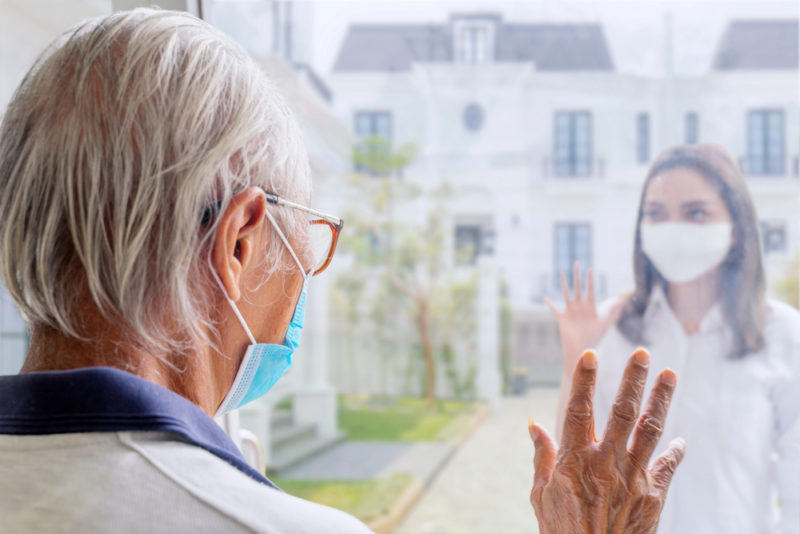Opinion
Orthodox Communal Findings
Who will enjoy tranquility and who will suffer: The impact of the pandemic on mental health
In Short
In terms of mental health, who was struggling with stress, depression and anxiety and who was lonely in 2020?
Findings from The Community Portrait Study 2021, Center for Communal Research, Orthodox Union.
Was I alone or were you right there with me in assuming that, as we faced Rosh Hashanah last year, we’d be striding forward into a sweet, new and COVID-19-free year?


Shutterstock
Those images from 2020 aren’t easy to forget. On one of my early ‘sanity walks’ last year, I passed by a Jewish eldercare facility. There stood a middle-aged woman, phone pressed urgently to her ear, her other hand splayed out against the glass window at the entrance. On the other side of the glass, two wizened hands pressed against hers, the figures of an elderly couple – perhaps her parents – cradling a phone, nodding, leaning in towards her. Fears for the physical health of the elderly acknowledged alongside deep concerns for their mental wellness in the face of what we all worried would be a protracted period of isolation. The anguish of visible distance.
Then there were the younger ones, with their college courses, short-term living situations, social lives and part-time jobs crashing down around them like an unscheduled demolition. As a high school teacher at the time, I saw their lives framed by Zoom windows. Confined to their bedrooms like political prisoners, they inhaled social media detritus that terrified, intrigued, and numbed them. Gym memberships, travel and graduations on hold or delayed indefinitely. Would they get to have those rite of passage experiences they saw as their birthright?
In terms of mental health, who was struggling with stress, depression and anxiety and who was lonely in 2020. Given that congregational prayer, Jewish learning and Shabbat meals with family and friends are core aspects of Orthodox life, how did the community fare without them? At the OU’s Center for Communal Research, we set out to answer those burning questions. Resilience of mind, body and spirit is a blessing. Moses bestowed it upon Joshua in his declaration “chazak v’ematz (be strong and resilient)” as he handed over the mantle of leadership. Who suffered, who was OK, and who thrived during the pandemic?
We conducted the Community Portrait Study, partnering with eleven synagogues in four Jewish communities: Atlanta, Dallas, Westchester, and West Hempstead. We surveyed members of these communities at three different time points during 2020, asking them to share with us indicators of their mental health. What did we find?
People’s rates of depression and anxiety (measured using the PHQ-4 scale) and stress (measured using the PSS-4 scale) did not fluctuate in response to stay-at-home orders and COVID-19 case rates. This means that regardless of the isolating lifestyle changes which were imposed upon them, their mental health remained stable. Typical was a woman in her 50s from Westchester who said, “We feel very fortunate to live in this community… we feel like we have a strong support system.” True, some faced challenges: “My brother passed away from COVID”, shared a woman, “Had the funeral on Zoom. My only sibling.” But overall, stress, anxiety, and depression remained steady at fairly typical levels.
Similar themes emerged when we looked at loneliness. People’s feelings of loneliness (measured using a Loneliness scale) did not fluctuate in response to COVID-19 case rates. What was also striking was that people’s closeness to G-d (measured using a Closeness to G-d scale) was statistically associated with not only lower levels of loneliness but also lower levels of depression and anxiety as well as stress.
Contrary to our original assumptions, we learned that it was not the elderly but younger people who had the highest rates of stress, anxiety, and depression. People over 65 were also less lonely than those than those who are younger. A man in his 40s from West Hempstead shared that “not having graduation was really hard on the kids,” another man in his 30s from the same community explaining that hours on Zoom without friends had made his children bored, withdrawn and lonely. On the other hand, a woman from Dallas shared that her Torah learning enabled her to reframe the challenges of the pandemic, “learning Torah (I also have a zoom shiur by a local Rebbetzin) accounts for my spiritual growth and Torah knowledge.”
Expressions of gratitude for support offered by family, friends and faith were interspersed with poignant reflections on the ways that the pandemic had widened existing proverbial cracks in relationships, human and divine. Overall, however, there was confluence between the quantitative and qualitative findings that religious faith and living in a religious community fortified this community’s mental health. Respondents’ capacity to interpret their experiences through a faithful lens and readiness to offer one another support seems to have sustained them. The Orthodox Union’s programming is informed by research such as this, enabling the prioritization of more targeted support for those who need it most. Orthodox communal life during the pandemic appears to be associated with strong mental health. Our research findings suggest that for many, strong feelings of belonging underpinned their resilience during the pandemic, making the world just a few shades lighter, warmer and more hopeful.
Adina Bankier-Karp, PhD, is a research fellow at the Center for Communal Research at the Orthodox Union.












